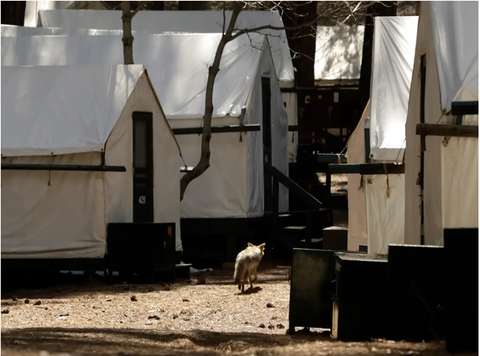RECLAIMING
Written by Philippa Taylor
March the 27th 2020 was a day that took many South Africans by surprise. Along with the rest of the world, we were being told to stay inside while our Country got ready for the spread of the Coronavirus. In a world that is always on the move, we were being told to stop. For many of us lockdown created uncertainty, fear of the foreseeable future, as well as the purchase of a large number of books and puzzles.
However, while South Africans were tucked away three Cape Town residents ignored Cyril Ramaphosa’s instructions to say home and they decided to take to the streets of Simon’s Town (Fig 1). This trio dressed in black and white set out to explore a part of the world that once belonged to them but has since been paved, built over and is now busy with cars and people, keeping them to the confines of Boulders Beach.

Three Penguins walking the streets of Simons Town on April 17 2020. SANNCOB/ Insider. (Fig 1).
Ronnis Daniels, from the Southern African Foundation for the Conservation of Coastal Birds (SANCCOB) who was following the penguins during their walk, stated: that the penguins were “enjoying having their territory back”. African Penguins are found in South Africa and Namibia and since the 20th century, they have become an endangered species.
These waddling wonders were not the only animals reclaiming their now peaceful surroundings. In California, when the Yosemite National Park was closed, there were reports of bobcats, coyotes, and bears exploring campsites and administrative buildings (Fig 2). There were also reports of bears using the roads to get to where they needed to be.

A coyote wonders around Yosmite Valley on April 11, 2020. Carol Cole/ Los Angeles Times via Getty Images. (Fig 2)
In our very own Kruger National Park, where ordinarily on game drives one has to sit and wait patiently to catch a glimpse of a lion, during lockdown they were found sleeping right in the middle of the road and not hiding away in the grass (Fig 3).

Lions napping on the road in Kruger National Park, South Africa on April 15, 2020. Richard Sowry/ Kruger National Park. (Fig 3)
During Israel’s lockdown wild boars started to roam the streets during the day. ‘Pig Patrols’ were created to chase the animals away when they got too close (Fig 4).

Wild boars cross a road, Northern Israel, on April 16, 2020. Ronen Zvulun/ Reuters. (Fig 4)
Looking into these stories the word ‘reclaiming’ becomes prominent. This is quite a powerful word for an image of three cute penguins wondering the streets but the truth is we have started to take more than our fair share and as the world starts to open up again, we need to remind ourselves that it should not take a pandemic for animals to roam happily, that humans and nature should be able to live as one.
These two images (Fig 5 & 6 below) are of the same story but from different sides, the one shows animals in man-made territories while the other is man-made objects in animal territories. So now is our time to decide which side of the narrative we want to be on. Do we want to look back at what was; or look forward to what could be?


Surfrider Foundation Europe. Goats walking the streets, North Wales. www.surfrider.fr (fig 5) Peter Byrne/ PA Wire/ PA Images(fig 6)
Outside the Art@Africa gallery situated in the Clocktower Centre at the V & A Waterfront, we are launching a penguin invasion. It is because of the reclaiming that took place during lockdown that we have created this sculpture garden to remind us all of how nature is not somewhere in the distance but amongst us.

3 m high Penguin Statue at the Waterfront

William Sweetlove, with whom the African Penguin is co – produced, and author of the Giant Penguin at the V&A Waterfront is a contemporary Belgian sculptor and an avid member of the ‘Cracking Art Group’ based in Italy. The main ambition of the group is for its members to spread a vision of the world loaded with elements of irony and ecological awareness. The Penguins you will see have bottles strapped to their back this showing how we have left the burden of pollution on the backs of nature rather than on man (Fig 7). It is through this invasion we hope to remind the viewer about our everyday use of single-use plastic and its effect on the environment.

Penguin with Bottle attached to back.
By working with the V & A Waterfront we have created this themed exhibition to draw attention to the impact plastic is having on nature. Humans have created 8.3 billion tons of plastic in the last 65 years alone. Art@Africa has decided that we will be on the side that has stepped back and makes changes, we hope you will join us.

